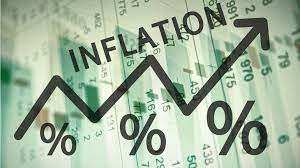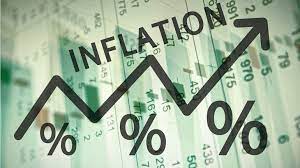
Inflation in the United Kingdom hit 6.2 per cent in February, the highest level since March 1992, as rising food, fuel, and energy prices exacerbate the country's cost-of-living crisis.
The Consumer Price Index for February was higher than the 5.9 per cent annual rate expected by experts polled by Refinitiv, and much beyond January's prior 30-year record of 5.5 per cent.
CPI inflation was 0.8 per cent on a monthly basis, beating predictions of 0.6 per cent and marking the biggest monthly CPI increase between January and February since 2009.
The Bank of England has raised interest rates three times in a row, taking borrowing costs from a historic low of 0.1 per cent to 0.75 per cent, as it tries to keep inflation under control without stifling economic growth.
Last week, the Monetary Policy Committee struck a more dovish tone than the market had anticipated, underlining the compression on household incomes as commodity prices rose sharply in the aftermath of Russia's invasion of Ukraine. Inflation is now expected to reach 8 per cent in the second quarter of 2022, according to policymakers.
The Office for National Statistics' chosen indicator, the Consumer Prices Index including owner occupiers' housing expenses (CPIH), increased by 5.5 per cent in the 12 months to February 2022, up from 4.9 per cent in the previous 12 months.
“The largest upward contributions to the February 2022 CPIH 12-month inflation rate came from housing and household services (1.39 percentage points, principally from electricity, gas and other fuels, and owner occupiers’ housing costs) and transport (1.26 percentage points, principally from motor fuels and second-hand cars),” the ONS explained in its report on Wednesday.
When British Finance Minister Rishi Sunak makes his Spring Statement later on Wednesday, he will be under pressure to address the cost of living crisis.
Many workers will see a 10 per cent increase in National Insurance (a tax on earnings) in April, while the UK's energy price cap will rise by 54 per cent to accommodate higher oil and gas costs, exacerbating the squeeze on household income as consumer prices continue to rise and Russia's war in Ukraine shows no signs of abating.
“This morning’s inflation data shows just how dire the situation is, and there is a clear need for the government to act to help save many from slipping into financial difficulty as their wages are quickly swallowed up,” said Paul Craig, portfolio manager at Quilter Investors.
“Markets and developed economies are continuing to battle soaring inflation alongside the uncertainty surrounding Russia’s war on Ukraine. Given the delicate market environment, investors will need to watch the data and markets closely and allocate accordingly.”
While fuel costs remain a big driver to U.K. inflation, the weight of their contribution to the total rate appears to be slowing, according to Dan Boardman-Weston, chief investment officer at BRI Wealth Management.
“The data continues to point towards another few months of rises in the rate of inflation, but we expect this to ease as we head into the summer. Given the strength of the labour market and the overall economy, it seems inevitable that the Bank of England will continue down the path of further rate rises,” Boardman-Weston said.
“Raising rates at a time of high household bills and rising taxes could stifle the economic recovery by putting the consumer under too much pressure though. The Bank will need to carefully balance the need to try and tame inflation whilst not tipping the economy into a recession.”
(Source:www.theguardian.com)
The Consumer Price Index for February was higher than the 5.9 per cent annual rate expected by experts polled by Refinitiv, and much beyond January's prior 30-year record of 5.5 per cent.
CPI inflation was 0.8 per cent on a monthly basis, beating predictions of 0.6 per cent and marking the biggest monthly CPI increase between January and February since 2009.
The Bank of England has raised interest rates three times in a row, taking borrowing costs from a historic low of 0.1 per cent to 0.75 per cent, as it tries to keep inflation under control without stifling economic growth.
Last week, the Monetary Policy Committee struck a more dovish tone than the market had anticipated, underlining the compression on household incomes as commodity prices rose sharply in the aftermath of Russia's invasion of Ukraine. Inflation is now expected to reach 8 per cent in the second quarter of 2022, according to policymakers.
The Office for National Statistics' chosen indicator, the Consumer Prices Index including owner occupiers' housing expenses (CPIH), increased by 5.5 per cent in the 12 months to February 2022, up from 4.9 per cent in the previous 12 months.
“The largest upward contributions to the February 2022 CPIH 12-month inflation rate came from housing and household services (1.39 percentage points, principally from electricity, gas and other fuels, and owner occupiers’ housing costs) and transport (1.26 percentage points, principally from motor fuels and second-hand cars),” the ONS explained in its report on Wednesday.
When British Finance Minister Rishi Sunak makes his Spring Statement later on Wednesday, he will be under pressure to address the cost of living crisis.
Many workers will see a 10 per cent increase in National Insurance (a tax on earnings) in April, while the UK's energy price cap will rise by 54 per cent to accommodate higher oil and gas costs, exacerbating the squeeze on household income as consumer prices continue to rise and Russia's war in Ukraine shows no signs of abating.
“This morning’s inflation data shows just how dire the situation is, and there is a clear need for the government to act to help save many from slipping into financial difficulty as their wages are quickly swallowed up,” said Paul Craig, portfolio manager at Quilter Investors.
“Markets and developed economies are continuing to battle soaring inflation alongside the uncertainty surrounding Russia’s war on Ukraine. Given the delicate market environment, investors will need to watch the data and markets closely and allocate accordingly.”
While fuel costs remain a big driver to U.K. inflation, the weight of their contribution to the total rate appears to be slowing, according to Dan Boardman-Weston, chief investment officer at BRI Wealth Management.
“The data continues to point towards another few months of rises in the rate of inflation, but we expect this to ease as we head into the summer. Given the strength of the labour market and the overall economy, it seems inevitable that the Bank of England will continue down the path of further rate rises,” Boardman-Weston said.
“Raising rates at a time of high household bills and rising taxes could stifle the economic recovery by putting the consumer under too much pressure though. The Bank will need to carefully balance the need to try and tame inflation whilst not tipping the economy into a recession.”
(Source:www.theguardian.com)





